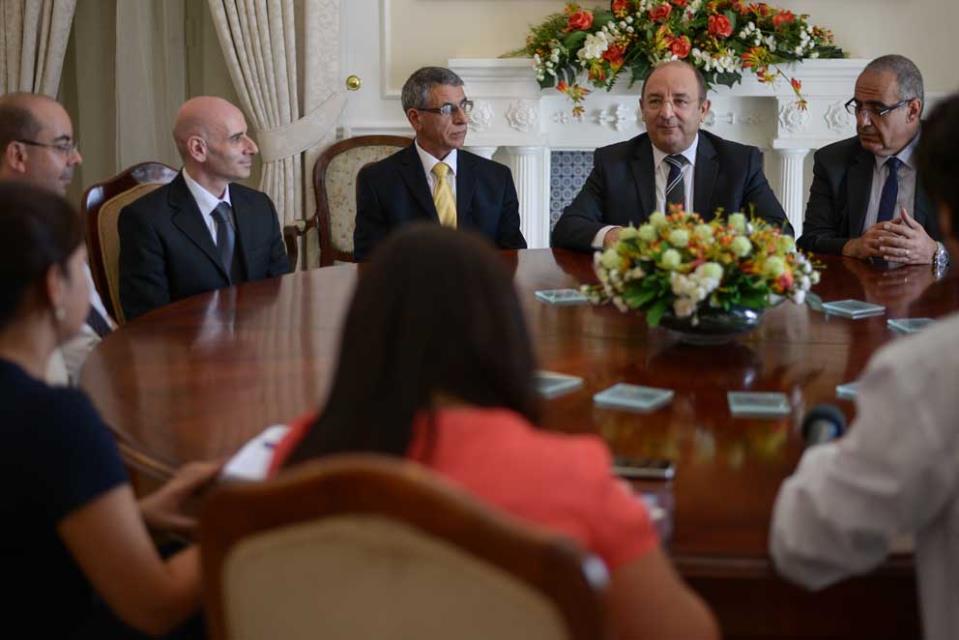Kevin Schembri Orland speaks with Social Solidarity Minister MICHAEL FARRUGIA about his childhood, his experiences and his policies in an attempt to get a glimpse of the man behind the Minister.
While many politicians draft policies on the advice of others, through consultations and the like, Social Solidarity Minister Michael Farrugia also speaks from experience.
The Minister has announced and launched numerous policies aimed at parenting, social issues and school attendance. He was born into a family that did not have much. "Up until the age of 14, I can say I lived in sub-standard housing, without a bathroom or a shower. My parents built a shower, which was something different, and we began to wash there instead of using a basin. It was an innovation," he said.
Dr Farrugia's father was a clerk and his mother used to work prior to her marriage, later becoming a housewife and taking care of her son. "My mum went through difficult times. Very few people know that she had a number of miscarriages. Nine years following my birth, she gave birth to a child, who was a Thalidomide baby. Back then, Thalidomide was used as an antiemetic but was later found to cause a number of side-effects, resulting in severe disabilities in newborns, many of whom eventually died. In fact, my sister died three days after she was born in 1966."
Living through such experiences means that Dr Farrugia feels close to his policies, as Minister for Social Solidarity. "I feel a sort of responsibility and closeness to my policies. It is not just with policies relating to disability. When I look back, I never forget where I came from. My parents, in spite of everything, invested in me. It is important for parents to invest in their children, irrespective of whether or not they are working or at risk of poverty."
Minister Farrugia turned to his positive parenting policy proposal, aimed at helping parents better communicate with their children, further reach out to them, and find a balance between their work and their role as parents. "If we tackle this policy well, then we can hopefully give children, especially those in problem situations, a better life. If these children are given a better future, then they will no longer be at risk of poverty or fall into the benefit trap, taking up employment and giving a better life to their own family. In fact, a number of incentives were introduced in the last budget relating to this.
"My intention is not just to get these people working, but to help give their children a better future while investing in their own. That way, when they grow old, they would have better pensions. If both spouses work and receive pensions, then they would have a high enough income to live a decent life in their old age."

Hint at a new pension policy
The Minister hinted at a new policy, currently still under internal discussion. The Minister could not reveal much at this stage; however he said that the plan should help a substantial number of elderly people escape from being at risk of poverty, referring to the electoral promise that anyone on the national minimum pension will earn enough to no longer be at risk. "This will help around 24,000 elderly over a number of years, as they would have a decent pension. When both spouses are in employment, they would have a decent income and where most individuals have a problem to live on their pension, they would receive enough not only to look after themselves, but to go back to the years when grandparents even used to support their grandchildren."
"When speaking about the retirement age, we need to look at whether it should be retirement age or pensionable age." He said that when compared to other countries, primarily referring to elderly in education or in work, "we score very low. We want to give the opportunity and incentives for the elderly to improve on the pension they earn. Through the new policy, we will hopefully look at how to improve pensions, not through third pillar pensions, but through the way we look at retirement age and pension age. This is an area I hope will see a lot of debate."
He discussed the financial management courses relating to the positive parenting policy. "Over the coming weeks, we will be working closely with local councils, and will give a number of lectures on how to make the most your money. The idea is to help people better prioritise their spending."
Minister Farrugia gave an example of bad financial management. "I am not against tattoos; however if a person has never worked, has a tattoo going all the way down their leg and another all the way down their arm, this would cost quite a bit, so this person would not be prioritising their spending well. I would rather teach these individuals to not only work, but also how manage their money. I could earn €40,000, but if I went out and bought a Maserati, then it would take me quite a while to pay it off. If I only earn €10,000, I would not go and buy an expensive car. It is all about prioritising one's spending. The best way to spend your money is on your children, so when they look back they can thank their parents for investing in them. Thanks to my parents' investment, I graduated, entered politics and got to where I am today. They taught me right from wrong and how to learn from others' experiences. They taught me to learn from my faults and not make the same mistakes twice."
Asked about the high percentage of elderly, the Minister explained that recent statistics show that Malta would reach a peak population of 470,000. "This is mainly due to legal migration, including migrants coming from within the EU. Most of them are in their 20s and 30s, thus are of working age, paying NI contributions, contributing to the economy and supporting our pension system. Thanks to this influx, we have enough people in employment. Nearly half of the jobs created over the past few years have been taken up by foreigners, not solely because the Maltese do not want to work at those jobs, but because some jobs require certain expertise the Maltese do not possess. Sadly, we are losing out on skills and I believe the Youth Guarantee should invest in educating people in these particular skills in order for Maltese to take these jobs."
Discussing his own education, Minister Farrugia said, "I attended the Marsa Primary School, and my secondary education at St Joseph's technical school in Paola." Following sixth form, he studied for his BSc, before transferring to the MD course after receiving his part one. "This wasn't my preferred profession. I originally wanted to be a pilot. I was going to join the first group of pilots that went to train, but was refused because I wore glasses. I then considered law; however my father put me off it and maybe this is one of the reasons I entered politics," he quipped.

"Entering the MD course was not easy, however the fact that I was already attending university and had received part one of the BSc helped. While in my first year of the MD, the MAM-government dispute was going on. It was tough back then, and I never held back from expressing my opinion. On the day of Karen Grech's murder, my letters began going through the armed forces to be checked. This never stopped and from 28 December 1977, up until today, all my post is checked prior to the letters being opened. My parents were very concerned in those days. I helped keep the medical course from closing and, eventually, from four students we grew to 30, carrying on through our clinical years.
"I was offered a number of opportunities to go abroad and keep my mouth shut, but I chose to remain and stick to my principles. While I was not against what the doctors were fighting for, I could also understand the government's position. There were two sides to the coin and both had valid points; however I could see that hospitals could not be run without housemen. You need them for a two-year period, especially because at that time the MD course only began every two years."
Turning to family support when family members fall victim to drug abuse and the like, the Minister said that everyone makes mistakes and at some point a decision must be taken "that can, on occasion, result in you losing your children, and go out there and find help or not. If they manage to do this, they should be given the opportunity to rejoin their children. Our current system does not give the right opportunities for those who want to receive help, or give the opportunity for children to receive a better life if their parents don't take the necessary opportunities. Currently, everyone is in the same basket and I believe we need different baskets, depending on whether one seeks help or not. We must also look at fostering and whether we should introduce permanent fostering and at open adoption and whether Maltese children can be put up for adoption." He also mentioned his hope that the centre for adoption and fostering will open by the end of the year.
The Minister also spoke about family values over the years "where, increasingly, both parents are entering the world of work, and where grandparents play a larger role. Interviews held with children by the Education Department reveal that children mention their grandparents as often as they mention their parents. Unfortunately, we are seeing more cases of broken families and families with problems. This is why we are trying to create an outreach programme. As of this year, through the restructuring of the Foundation for Social Welfare Services (FSWS), we plan to include a community outreach unit. Instead of waiting for families to refer to us, we will attempt to identify these families, go to their homes, speak with them and try and come up with a family plan to prevent problems reaching the point of no return. While speaking with Apostolic Administrator Scicluna, we discussed the fact that marital problems in families usually become apparent quite late and we want to identify them at an earlier stage. Through the relationships policy that will be discussed in the coming months, together with positive parenting, we would be able to open this unit and tackle problems at an early stage."

I originally refused to be a candidate
Discussing his entrance into politics in 1987, he originally refused to run as a candidate. Up to a day before candidates were meant to register, he had been telling people he was not going to contest the election, but changed his mind at the last minute. "I remember a mass meeting held in Naxxar, the district I contested, and a day prior we bought cloth and drew my name in paint and hung it up, letting everyone know I was contesting. I was taken by surprise, as going out for the first time, in a district where nobody knew me except for the fact that I had begun working as a GP, I received 800 votes. They believed in me."
Asked about his position on problem gambling, he believes that it is not a proper use of income. "We have a number of people who believe they can become a millionaire in a day, spending many euros a week gambling rather than prioritising food. We know there are problems, especially when the Super 5 jumps the €500,000 mark."
Asked about the amount of gambling institutions in Malta and whether they add to the problem, he said that "regulation is the word. We need to regulate e-gambling, casinos and so on. Otherwise, we know that many Maltese would go abroad to gamble."

Women three times more likely to abuse legal drugs
The problem of substance abuse and problem gambling is more prevalent now than when he was a child, he said. "One of the biggest concerns surrounds abuse of legal drugs, which is often shoved to the side. It is very common among women and a study by the Council of Europe of 17 countries shows that there are as many as three times more females abusing legal drugs, while more males tend to abuse illicit drugs than females. In a conference in Strasbourg, I mentioned that I had more patients dying from alcoholism and legal drugs than persons dying of illicit drugs. This does not mean illicit drugs are fine, but we often forget about alcohol and legal drug abuse."
Turning to separated or divorced families, the Minister said: "I am separated, I am divorced and the most important thing is for the children to come first. Any marital problems should never involve the children. After separation and divorce, children should not be used as pawns; they should be given full support, attention and respect. You must always be available to listen to them, to help them during their time of need. Children should feel confident that, in spite of their parents' marital problems, they can speak about their own problems and feel free to talk with both parents. I also believe that one should not be a parent and a child. Both parents should be able to talk as friends and change their relationship into one similar to that of brother and sister".
With regard to single parents, "we are trying to give the necessary incentives to involve them in the world of work, introduce family-friendly measures and help them earn enough income to take care of themselves and their children properly. We would like to tackle the 'unknown father' issue and, through the policy of single parenting, we will look at other countries which have made inroads in this area and then adjust it to our scenario. The more advanced countries in this regard are those in Scandinavia, along with a few states in the US."